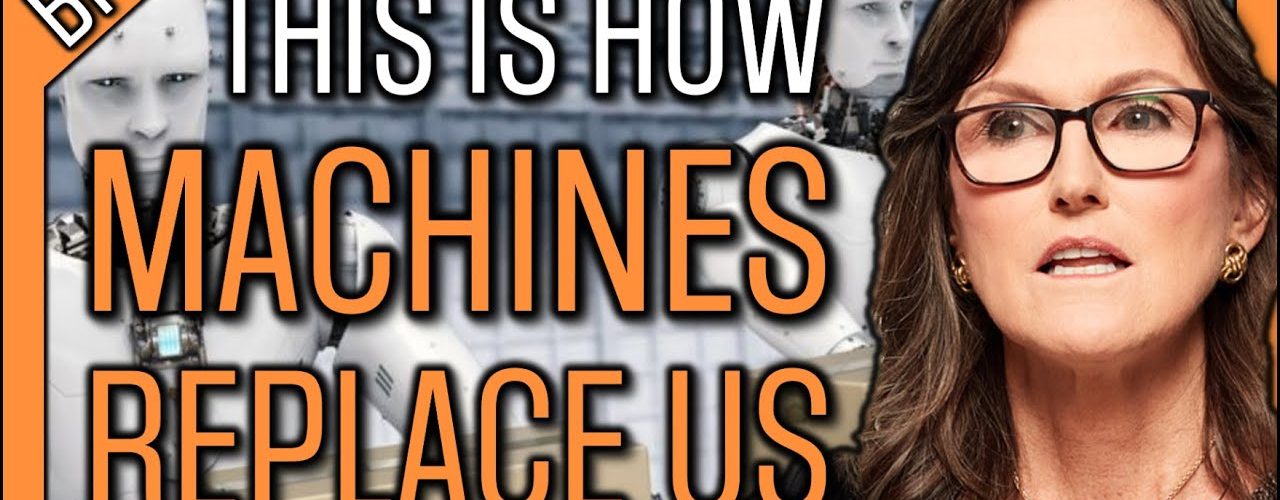Mentioned in Video:
- Find me on Twitter: https://twitter.com/TickerSymbolYOU
- My free Discord: https://discord.gg/9UHrHex4JX
- ARK Invest's Big Ideas 2021: https://ark-invest.com/big-ideas-2021/
- Support the channel and get extra member-only benefits by joining us on Patreon: https://www.patreon.com/tickersymbolyou
🤖 Will robots steal our jobs? Cathie Wood and Brett Winton of #ARKInvest hosted a podcast where they discussed #BigIdeas2021, including how some of their favorite investments — #Tesla stock (TSLA), Amazon stock (AMZN), and other manufacturing giants — are automating millions of jobs. Will your job be one of them?
Video Transcript:
[00:00:00.000]
The world is changing. Sometimes in ways that excite us, and sometimes in ways that can be scary. Automation is one of those ideas that excites me because I want to live in a better, more efficient, and more productive world. But the idea of automation can also be scary. After all, the next job that's given to a robot could be mine.
[00:00:18.470]
So I'd like to give you a better sense of our robot-filled future by answering three pretty important questions. First, what kind of jobs do robots take today? Second, what kind of jobs will robots take next? And third, what companies are pioneering these robots so we can make sure that our livelihoods and our investments stay on the right side of change.
[00:00:40.080]
In 2015, a study by Oxford University titled The Future of Employment, How Susceptible Are Jobs to Computerization showed that automation will eliminate more than 8 million jobs by 2025, and that number rises to an astounding 75 million jobs by 2035. For perspective, the US Labor force is currently at about 165,000,000 people, meaning that robots would take around 46% of all jobs if every job a robot had was a job that could be given to a human instead. But that Oxford University study doesn't show the full story.
[00:01:15.160]
Instead, we can turn to ARK Invest, who focuses all of their research on innovative technologies that can be applied across many different markets and geographies. Innovations like robotics and automation, which actually have been one of their core research areas since they were founded. Cathie Wood, ARK Invest's founder, CEO and CIO and Brett Winton, ARK Invest's director of research, recently did a podcast where they talked about ARK Invest' s Big Ideas for 2021, which is a research publication they release every year to talk about the technology platforms they think will change the world soon, like, starting now, soon.
[00:01:49.770]
Robotics, and now the more broad concept of automation have made this list every single year. So let's see what they have to say about that Oxford University study, as well as their follow up research on robots taking our jobs.
[00:02:02.190]
When we started the company, the headline, I think this was from Oxford University, a study. The headline of the study was 47% of all people in the United States (it was a US study) are going to lose their jobs to automation, artificial intelligence in the next 20 to 25 years, and they left it there, hair on fire. You know, it caused a ruckus. And we did the rest of that study actually, Brett leading our analyst, there were 700 occupations that they believed are going to be mechanized. And when we did that study, the right answer, and the full story was yes.
[00:02:46.050]
And because of this, GDP in the United States in 2035 will be not 28 trillion, but 40 trillion. And our job is to find where that $12 trillion is: new jobs, completely new jobs we cannot even imagine today. Who could have imagined the gig economy back in the early 90s, Uber drivers and so forth. The same thing's going to happen except much more rapidly.
[00:03:16.180]
Let's break that down and answer the first question of what kind of jobs robots are taking right now. Robots are taking jobs that are well suited to mechanisation, which literally means the introduction of machines or automatic devices into a process, activity or place. Farmers replacing horses and mules with tractors is an example of mechanisation. So what did this transition from horse to tractor actually do for agriculture? Tractors replaced more than 80% of all horses and mules in the 50 years since their introduction, displacing the farm workers associated with raising and caring for those animals in the process, as well as the humans working the fields that now one person and a tractor could fully replace.
[00:03:56.520]
As a result, the number of farm workers in the US dropped from around 10 million in 1950 to around 3 million in the year 2000. However, farm output just about tripled in that same amount of time. Three times more output with three times fewer workers means that farm productivity per person went up roughly nine X. That's huge. But let's talk about the farm workers that actually got displaced by tractors, since that's the scary part. It turns out that three quarters of the roughly 10 million farm workers were unpaid family workers.
[00:04:28.750]
Two qualities of jobs that can be mechanized are that they're highly repeatable and they're mechanically straightforward, which means they tend to be underpaid or unpaid jobs. In fact, 82% of the farming jobs lost to mechanization were those unpaid jobs. There is one other quality of a job that's prime for mechanization today, and that's jobs that are somehow dangerous for people to do. Arc welding, which uses an arc of electricity to melt metals together, comes with dangers like arc burns and inhaling toxic fumes. Mechanical cutting, grinding, deburring and polishing all involve tools and processes that require safety precautions and protective equipment for humans, but not machines.
[00:05:07.980]
Painting, gluing, adhesive, ceiling and spraying, the list goes on and on for these hazardous, tiring, high repetition tasks. Once a job is mechanized, such as a horse's job moving to a tractor or a welder becoming a welding arm controller. That job is a candidate for automation, for example, programming the arm to do the job without needing the human at all is automation. So the jobs that robots are taking over right now are exhausting, repetitive, mostly straightforward, underpaid and sometimes dangerous. Those are the jobs that make sense for company to mechanize and then fully automate. Today, most of those jobs are in manufacturing.
[00:05:45.310]
So, what kinds of jobs will robots take next?
[00:05:50.240]
Taking what we learned from how the manufacturing sector automated… It took, I believe, was it 15 years? No. 25 years. So from 1990 to 2015 for the manufacturing sector to go from 20 robots per 10000 employees to I think that was 200. And our work now suggests that this is going to happen economy-wide around the world, depending on the development of the country, in just five years, the same level of automation. Again, AI plays importantly into this, as does battery technology, both of them foundational to what is going on.
[00:06:37.040]
Yeah, and if you think about that in some ways, that sounds like, oh my gosh, that's really quickly. Manufacturing, which is very well suited to robotization or mechanization, took 25 years to take up kind of these systems, these automation systems. And how is the whole economy going to do the same thing? Well, for one thing, 250 robots per 10,000 employees. That could be a quite low number. There's no reason why you wouldn't have an employee who is essentially using multiple robots or tools to produce the things that the employee is producing.
[00:07:09.900]
And what the advance and robots that's interesting to us is the combination of AI and more advanced and inexpensive sensors, and even just like programming interfaces, allows them to work right alongside a human. And you should also think about robots broadly, and that getting a drone delivery that's a robot, potentially the Fry Cook in a restaurant is a robot arm. It will enable adaptive robots to backwards integrate with current processes in a much easier way, which allows the uptake rate to be faster. With manufacturing, you kind of have to build a giant cage and then you have to hire specialized engineers to determine exactly how that robot is going to move and it'll move very quickly. The next generation of robots is going to be something that you can…
[00:07:55.090]
It's not doing it quite right. The person that's working on the line can help it to work more effectively, and it's not going to accidentally knock that person's head off because it's going to have sensors to prevent it from doing so. And so it allows it to be more completely integrated in processes that are already working for businesses today.
[00:08:11.380]
As part of their follow up on that University of Oxford study, ARK Invest published a white paper called The Future of Automation. And in it they project the number of employees replaced by automation per industry in 2025 and 2035. Automation will have big impacts in many industries, including manufacturing, retail, trade, warehousing, finance and insurance, education, health care and accommodation and food services.
[00:08:37.290]
Don't worry if you see your industry on this list.
[00:08:39.840]
Let me explain why. One important call out that they make is automation won't cause mass unemployment. It will just change what kind of jobs exist. For example, many of these industries, like finance, education and health care, already automate many parts of their business. Data entry, client and student registration, appointment booking, basic employee training, and even some automatic responses to customer inquiries. These used to be exhausting repetitive, mostly straightforward jobs that are now mostly automated in software. It's also worth noting that automation doesn't always result in fewer jobs. Since deploying its first robot in 2012,
[00:09:17.280]
Amazon has ramped up to well over 200000 robots in their fulfillment centers, and they've also increased employment by sevenX. Automation, whether it comes from robots or not, tends to come with a lot of benefits. Higher wages for employees since their jobs become more complex. Lower prices for consumers since production costs are now lower, higher profit margins for companies because they tend to split the difference and all of that drives them to invest more and more in automation in the future. And, just like software automation transformed those industries
[00:09:48.810]
collaborative robots or Cobots will transform the physical parts of these industries as well. ARK invest believes that all robots will be collaborative robots in the long run. Collaborative robots are much cheaper than traditional industrial robots because they don't need the same levels of safety barriers or specialized programming, which ends up being around 70% of the total cost of the robot. And since they're much cheaper, they can penetrate existing markets as well as grow new ones. Here are some types of physical jobs that collaborative robots may change for the better.
[00:10:21.240]
Cleaning jobs, such as washing cars, clothes, dishes and surfaces; picking and packing jobs such as those done by backroom and warehouse workers today, and food preparation jobs and related food services. Whether you enjoy it or not, cooking for yourself and cleaning up after are unpaid labor. The same goes for grocery shopping. These three activities, grocery shopping, cooking at home and cleaning up amounts to over 1.5 trillion dollars in unpaid economic activity each and every year, which is two times more than the costs we attribute to just our grocery bills. Said a different way,
[00:10:55.620]
the ingredients in an average meal cooked at home costs roughly $3. But when you add in prep, cooking and cleaning, that cost jumps to $12 per meal, which is already close to the price of an average meal at, say, Applebee's. As the cost of dining out continues to drop thanks to mechanization and then automation, dining will shift from in home to out of home. Food and grocery delivery is also prime for more mechanization, since most US households live around 2 miles from any supermarket and within 4 miles of their preferred supermarket.
[00:11:27.630]
Here's how ARK Invest's research suggests that will happen and what companies they're investing in accordingly.
[00:11:33.760]
I'd love to get more into drones because here's a provocative way to understand what's going on and how quickly it might happen. According to Tasha's work, the cost for a drone to take a parcel over a ten mile area will be roughly $0.25. Today, even if we introduced drones that were remotely piloted, again, introducing human beings into it, the cost would be, for the same thing would be $7.80. Now that $0.25 is at scale as when we really have a sky full of drones delivering packages. But you can see the human part of it is not going down in terms of wages or salaries.
[00:12:25.840]
But taking the human out of the equation, and by the way, I do believe we're going to end up in a labor shortage again. So this will be a very useful thing for us. The more repetitive jobs are going to succumb to mechanization, and the more interesting jobs will go to human beings who will be helped by robots.
[00:12:47.650]
With autonomous taxis, they're still going to be a human in the system. And what autonomous taxis are really going to displace is all of the amateur drivers, you and me we're amateur drivers. And then, in fact, if we calculated the cost of driving to us personally over the course of our lives, it would drive us nuts. It's like you don't get paid for sitting in the car driving, but it's clearly economic activity. One of the things that innovation does is it takes non-market activity and it turns it into a market service.
[00:13:18.250]
And so autonomous taxi platforms are the big laborforce that's going to displace is an unpaid labor force. And I'm looking forward to watching on Netflix and the backseat of an autonomous taxi someday, because driving it's boring and it's laborious. It's not like using your human creative potential to its maximum degree.
[00:13:38.400]
So let's talk about some of the companies that are mechanizing and automating these underpaid and laborious jobs, and some of their biggest beneficiaries. At the top of the list is Amazon, ticker symbol AMZN. With over 2000 robots employed in their warehouses taking on a variety of tasks, rolling robot shelves, robot arms, aerial drones, and autonomous groundbased delivery systems. When it comes to automation, Amazon is one of the current champions. One of my favorite things about following ARK Invest is seeing which companies they invest in overseas.
[00:14:12.060]
Jd.com, ticker symbol JD is the largest retailer in China. They are a logistics titan in their own right, delivering most orders in less than a single day. And, like Amazon, they're working to automate as much of their massive logistics chain as possible. So here's an example of how the cost associated with moving goods is declining dramatically, even outside the warehouse or factory four. Speaking of factory fours it's hard to beat the ones in the Tesla gigafactories, ticker symbol TSLA. Elon Musk often says that as other manufacturers catch up in batteries and self-driving technologies, Tesla's longterm advantage will actually be in the manufacturing capabilities of the gigafactories.
[00:14:54.100]
Of course, Tesla is also aiming to automate the unpaid task of driving unlocking that time for commuters to enjoy things like Netflix in their backseats. ARK Invest holds just under $4 billion in Tesla stock, and it's their number one position by a very large margin. So I'd be pretty crazy, not to mention it, right. Flipping the script, Teradyne, ticker symbol TER makes automated test stations that can backwards integrate with existing factories and collaborative robots, exactly like Brett Winton mentioned earlier. Because testing is an important part of manufacturing across all industries and market sectors,
[00:15:28.390]
Teradyne is Arc Invests 40th biggest position with over $350,000,000 in it across ARKK, ARKQ and the recently launched ARKX. I think there will be many beneficiaries from autonomy, like Netflix, once our commute times turn into free time. However, an interesting one might be Dominos, ticker symbol DPZ, which really is working to drive down pizza delivery costs on the ground and one day, even from the sky. Pretty soon we may be asking, is this DiGiorno? Nope. It's delivery. In the end, whether we like it or not, the robots are coming.
[00:16:04.320]
But I think we should be much more excited than afraid because they're coming to help us do the tough, dangerous and often thankless jobs while unlocking new jobs that we can only dream of today. And I'm excited to dream them up with you. This is Ticker Symbol: You. My name is Alex reminding you that the best investment you can make is in you.
If you want to comment on this, please do so on the YouTube Video Here














